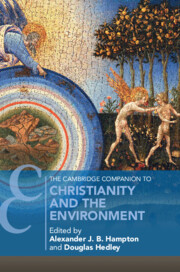Book contents
- The Cambridge Companion to Christianity and the Environment
- Cambridge Companions to Religion
- The Cambridge Companion to Christianity and the Environment
- Copyright page
- Contents
- Figures
- Contributors
- Preface
- 1 Introduction
- Part I Concepts
- Part II Histories
- 8 Environmental Perspectives in Ancient Greek Philosophy and Religion
- 9 Medieval Nature and the Environment
- 10 Natural Philosophy in Early Modernity
- 11 Protestantism, Environmentalism,and Limits to Growth
- 12 Romanticism, Transcendentalism, and Ecological Thought
- 13 Contemporary Religious Ecology
- Part III Engagements
- Index
- Cambridge Companions to Religion
- References
10 - Natural Philosophy in Early Modernity
from Part II - Histories
Published online by Cambridge University Press: 21 July 2022
- The Cambridge Companion to Christianity and the Environment
- Cambridge Companions to Religion
- The Cambridge Companion to Christianity and the Environment
- Copyright page
- Contents
- Figures
- Contributors
- Preface
- 1 Introduction
- Part I Concepts
- Part II Histories
- 8 Environmental Perspectives in Ancient Greek Philosophy and Religion
- 9 Medieval Nature and the Environment
- 10 Natural Philosophy in Early Modernity
- 11 Protestantism, Environmentalism,and Limits to Growth
- 12 Romanticism, Transcendentalism, and Ecological Thought
- 13 Contemporary Religious Ecology
- Part III Engagements
- Index
- Cambridge Companions to Religion
- References
Summary
This chapter examines natural philosophy in the early modern period (roughly 1600-1800), focusing on three areas: 1) the so-called mechanisation of nature, which presents a rival understanding of the natural order to that of medieval Aristotelianism; 2), the rise of experiment and laws of nature as tools for the knowledge of nature; 3) the emergence of new theologies of nature and new methods of biblical interpretation, which develop in concert with wider changes in natural philosophy. The chapter demonstrates how early modern thinkers inherit and transform the natural philosophy of the medieval Latin tradition, producing new philosophical and theological accounts of nature that are sufficiently comprehensive to rival the Christian-Aristotelian framework of the Middle Ages.
Keywords
- Type
- Chapter
- Information
- The Cambridge Companion to Christianity and the Environment , pp. 150 - 162Publisher: Cambridge University PressPrint publication year: 2022

